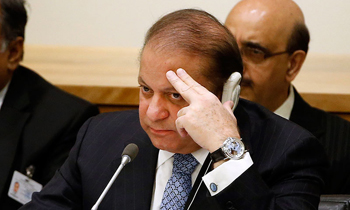Islamabad, Jul 11: In a setback to Pakistan PM Nawaz Sharif, a Supreme Court-ordered probe panel in its final report on the Panamagate on Monday recommended filing of a corruption case against him and his children after finding "significant" disparities in their income and actual wealth.
The six-member Joint Investigation Team (JIT) that probed the Sharif family's business dealings in its report submitted to the apex court recommended that a corruption case should be filed against Sharif and his sons Hassan Nawaz and Hussain Nawaz, as well as daughter Maryam Nawaz, under the National Accountability Bureau (NAB) ordinance 1999.
The report, however, was slammed by the Nawaz Sharif government as "trash" with PM's close aide and minister for development Ahsan Iqbal in press conference with other ministers, saying they will challenge the report in the Supreme Court and will "completely expose and unveil its contradictions and falsifications."
Sharif's daughter Maryam also rejected the report, saying, "JIT report REJECTED. Every contradiction will not only be contested but decimated in SC. NOT a penny of public exchequer involved."
The JIT report said the assets of all four respondents were found to be more than the sources of their income.
"Significant gap/disparity amongst the known and declared sources of income and the wealth accumulated by the Respondent No. 1, 6, 7 and 8 have been observed," the JIT observed in its concluding remarks. Respondent 1 refers to Prime Minister Sharif; Respondent 6 was Maryam; Respondent 7 Hussain; while Respondent 8 was Hassan.
The report said the financial structure and health of companies in Pakistan having linkages to the Sharif family also do no substantiate their wealth. It also highlighted "irregular movement" of huge sums of money in the form "loans and gifts" between Sharif and his youngest son from various companies set up in Saudi Arabia, the UK and the UAE.
The report said the role of off-shore companies is critical as they have been identified to be linked with their businesses in UK. The JIT also said that the Sharifs were unable to provide substantive evidence of a reliable money trail, used to buy expensive properties in London.
Sharif held consultations with his aides after the report was filed with the court.





Comments
Add new comment